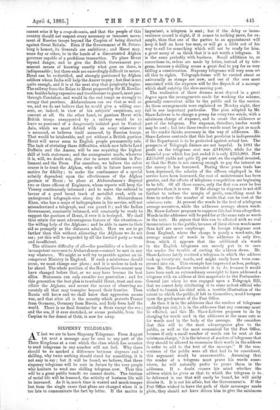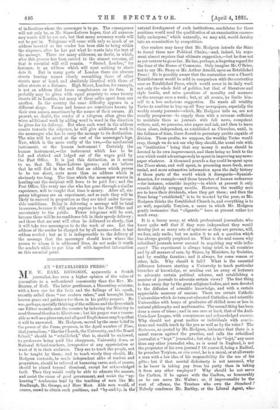SIXPENNY TELEGRAMS.
AT. last we are to have Sixpenny Telegrams. From August 1st next a message may be sent to any part of the Three Kingdoms at a coat which the class which has occasion to send telegrams in any number will not feel. Why there should be so marked a difference between sixpence and a shilling, why twice nothing should stand for something, it is not easy to say ; but it will be found, we believe, that three sixpenny telegrams will be sent in future by the very people who hesitate to send one shilling telegram now. That this will be a great public benefit we cannot doubt. The friction of social life will be lessened, the activity of business life will be increased. As it is, much time is wasted and much temper lost from the single cause that plans are changed when it is too late to communicate the fact by-letter. If the matter is
important, a telegram is sent ; but if the delay or inconvenience caused is slight, if it comes to nothing more, for example, than that one of the parties to an appointment will keep it half an hour too soon, or will go a little out of his way to call for something which will not be ready for him, a great many of ua think that it is not worth a telegram. It is the same probably with business. Small additions to, or corrections in, orders are made by letter, instead of by tele gram, because a shilling seems a great deal to pay for so very trifling a consideration. Sixpenny telegrams will very soon set all this to rights. Telegraph-forms will be carried about as universally as stamps are now, and one of the uses most associated with the sixpence will be the dispatch of a message which shall outstrip the slow-moving post.
The realisation of these dreams must depend in a great degree upon the arrangements made for working the scheme, generally convenient alike to the public and to the service. As these arrangements were explained on Monday night, they fail in one important particular. The plan adopted by Mr. Shaw-Lefevre is to charge a penny for every two words, with a minimum charge of sixpence, and to count the addresses as part of the telegram. For sixpence, therefore, twelve words may be sent ; but into these twelve words must be got as much as the sender thinks necessary in the way of addresses. Mr. Shaw-Lefevre contends that this last provision is indispensable if the Department is to be protected 'against actual loss. The prospects of Telegraph finance are not hopeful. In 1884 the profit on the telegrams sent was £410,000, while for the financial year which has just ended it is only £255,000. Now £255,000 yields not quite 2-1per cent. on the capital invested, so that the State is not earning enough to pay the interest on the money it has borrowed. During these years trade has been depressed, the salaries of the officers employed in the service have been increased, the cost of maintenance has been greater, and the effects of telephone competition are beginning to be felt. Of all these causes, only the first can ever be less operative than it is now. If the change to sixpence is not still further to reduce the margin of profit, something must be done to reduce the number of words that can be sent at the minimum rate. At present the words in the text of a telegram average seventeen, while the addresses average eleven words. Mr. Shaw-Lefevre proposes to suppress this last item altogether. Words in the addresses will be paid for at the same rate as words in the text. He argues that this can be effected with no real inconvenience to the public, because of these eleven words more than half are mere surplusage. In foreign telegrams sent from England, where the charge is purely a word-rate, the
average number of words in the addresses is, only five,
from which it appears that the additional six words in the English telegrams are merely put in to save the sender the trouble of cutting the address down. Mr.
Shaw-Lefevre lately received a telegram in which the address took up twenty-six words, and might easily have been com pressed into six. This example has impressed us less, perhaps, than Mr. Shaw-Lefevre intended it to do, because it would have been such an extraordinary oversight to have addressed a telegram with an address of this magnitude to the Postmaster General just when he was engaged upon a Telegraph Bill, that we cannot help attributing it to some ardent official who wished to furnish his chief with a terrible illustration of the extent to which the public, if left to themselves, would trespass upon the good-nature of the Post Office. As then it is in the addresses that the senders of telegrams specially run riot, it is in the addresses that any economy must be effected, and this Mr. Shaw-Lefevre proposes to do by charging for words used in the addresses at the same rate as for words used in the body of the message. He considers that this will be the most advantageous plan to the public, as well as the most economical for the Post Office, because if only a small number of words can be sent at the minimum charge, " it is the interest of senders of telegrams that they should be allowed to economise their words in the address in order to add to the text of the message." If the con venience of the public were all that had to be considered, this argument would be unanswerable. Assuming that the sender of a telegram must prune his words somewhere, he will naturally prefer to prune them in the addresses. If a doubt crosses his mind whether the address which he gives as that to which the telegram is to . be delivered is one that will easily be found, he will airily dismiss it. It is not his affair, but the Government's. If the Post Office wished to have the path of their messenger made plain, they should not have driven him to give the minimum
of indications where the messenger is to go. The consequence will not only be, as Mr. Shaw-Lefevre hopes, that all unnecessary words will be cut out, but that many necessary words will not be put in. Telegrams will come with only so much of an address inserted as the sender has been able to bring within the sixpence, after he has put what he wants into the text of the message. There are many addresses; no doubt, in which, after this process has been carried to the utmost extreme, all that is essential will still remain. " Strand, London," for instance, is an address which will want nothing to elucidate it. But in many parts of London there are obscure streets bearing names closely resembling those of other streets near at hand, and absolutely identical with those of other streets at a distance. High Street, London, for example, is not an address that bears completeness on its face. It -probably may be given with equal propriety to some twenty streets all in London, but many of them miles apart from one another. In the country the same difficulty appears in a different shape. Farms and houses are sometimes known by their own names, sometimes by the names of their owners. At present, no doubt, the sender of a telegram often gives the wires additional work by adding word to word in the direction he gives for its delivery. But when each word in the address counts towards the sixpence, he will give additional work to the messenger who has to carry the message to its destination. The wire will be saved at the cost of the messenger's legs. Now, which is the more costly of the two,—the mechanical instrument, or the human instrument ? Certainly the human instrument,—the instrument which has to be fed and clothed and lodged out of the wages paid by the Post Office. It is just this distinction, as it seems to us, that Mr. Shaw-Lefevre ignores ; and we believe that he will find in the end that an address which proves to be too short, costs more than an address which is obviously too long. The time which the messenger wastes in hunting-opt the recipient will have to be paid for ; and the Post Office, like every one else who has gone through a similar experience, will be taught that time is money. After all, sixpenny telegrams are an experiment, and as such they will be likely to succeed in proportion as they are tried under favourable conditions. Delay in delivering a message will be fatal to success,. because it will mean expense to the Post Office and uncertainty to the public. Fewer telegrams will be sent, because there will be no confidence felt in their speedy delivery ; and those that are sent will often be delivered so slowly, that it will take two messengers to do the work of one. Let the address of the sender be charged for by all means—that is but seldom needed ; but as it is indispensable to the delivery of the message that the messenger should know where the person to whom it is addressed lives, do not make it worth the sender's while to put him off with imperfect information on this essential point.



































 Previous page
Previous page